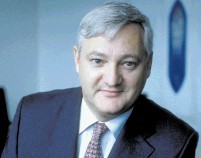
Oil and gas giant Shell said yesterday its chief executive, Peter Voser, 54, would quit the post in the first half of 2014.
The surprise announcement came as the group unveiled its first-quarter results, including pre-tax profits of £8.5billion.
Mr Voser, who was appointed chief executive in 2009, had been an executive director with the company since 2004.
In a message to staff, Mr Voser said: “After almost 10 years as chief executive and chief finance officer and more than 25 years in Shell, I have elected to retire in the first half of 2014.
“After such an exciting executive career I feel it is time for a change in my lifestyle and I am looking forward to have more time available for my family and private life in the years to come.”
Mr Voser is widely credited as having streamlined Shell’s previous complex structure and speeded up decision-making after the firm had been criticised over a series of delays and cost overruns at some of its most high-profile projects.
Shell has carried out a string of massive developments under his stewardship, including the Pearl venture in Qatar, and also made large investments in Brazilian biofuels and a floating liquefied natural gas plant in Australia.
Chairman Jorma Ollila said: “Peter’s leadership of Shell over the last four years has been impressive, reorganising the company, delivering growth and developing a clear forward strategy with a strong portfolio of new options.”
Shell said adjusted net profits – using its current-cost-of-supply measure – rose to £4.8billion in the first quarter of 2013, from £4.7billion a year ago, compared with expectations of around £4.2billion.
Mr Voser said: “These results were underpinned by Shell’s growth projects and an improvement in downstream profitability, and were delivered despite a difficult security environment in Nigeria.”
First-quarter 2013 production was more than 3.6million barrels of oil equivalent (boe) per day, up slightly from last year’s 3.5million.
The latest period saw Shell complete the acquisition of an additional 5.9% interest in the Schiehallion field west of Shetland, increasing the company’s interest to 55%.
It also completed the acquisition of additional interests in the UK North Sea Beryl fields, lifting Shell’s production in the area from 9,000boe per day to 20,000.
Recommended for you
